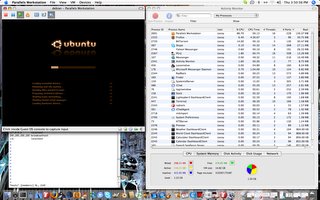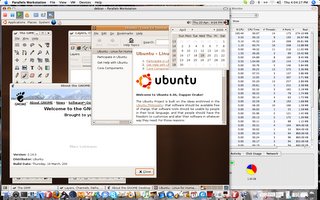 (Updated) - The world turned upside down the past few weeks as Boot Camp went into full swing. And no they won't be joining the boys and girls in Iraq pretty soon, rather--- hell froze over and Windows once stuck in black, borning boxes could now reside on the stylish Mac hardware.
(Updated) - The world turned upside down the past few weeks as Boot Camp went into full swing. And no they won't be joining the boys and girls in Iraq pretty soon, rather--- hell froze over and Windows once stuck in black, borning boxes could now reside on the stylish Mac hardware.Dual booting has been around for years--- linux users have been booting windows in their boxes thanks to bootloaders like lilo and grub. now, Boot Camp is a similar tool--- essentially getting windows to boot on an intel mac. now as hackers have showed in the past few months, it takes a little bit of hack to pull it off. for one thing, the mac has no legacy bios to worry about--- which is problematic in that Windows lives in the archaic past and does not support (nor will Windows Vista) EFI. thanks to Apple, it can now be done.
Many people have tried boot camp and have successfully dual booted windows xp and os x--- you'd have to bring your own licensed copy of XP to the party though. Still, after years of being a Linux user, i've had my fair share of dual booting. And yes certainly it is very helpful to dual boot especially for that app that only exist in Windows that you couldn't live without and for the occassional games one might want to play. Take it from me--- six years of this dual booting thing is a hassle. Nothing is better than running on one single operating system or having another computer do that one other thing you might need it to do.
Now here comes the solution. Virtualization. It isn't new--- its been around (the technique anyway) since the day mainframes were king of the world. And there are many companies/organization that offer such solution--- VMware, Microsoft, Xen, OpenVZ but this upstart--- Parallels runs on OSX, among other things. You could for instance run, in near native speed, Windows XP side-by-side with OSX, and switch by just tapping on your keyboard.

Now, we've all seen and heard the promise that Virtualization has given. I have had numerous opportunities in the past to try it out, and at the end of the day, preferred to run my apps on a separate machine.
Still, its been years--- and the business has matured and everything else looks promising so why not give it a try? So I spent a week's Easter vacation running through hoops to get Parallels a shot. And after several failed attempts to get it to do what i want, like system crashes, did i just say that?
Parallels was finally running Ubuntu Linux beside my OS X. The choice of Ubuntu is simply to get one distro running in my experiment. Parallels has several options--- Windows, Red Hat, Suse, Debian and many others, though personally i'd love to put gentoo linux on this thing, but the lack of network support and the fact i crashed my mac several times doing it... i just wanted to get something to work. (Update) - Was able to get the networking stuff going by using dhcp--- though i still haven't been able to get it when i plug the mac direct to my adsl modem, i was able to do it by building a home-router-dhcp-linux box.

Man, it responds in near native performance, it even has sound to boot. The only thing I have problems with this and a lot of people, judging by the forum responses over at Parallels is having the same--- the lack of good network support. A guest OS still can't connect to the internet.

There are a few people over at the forums and over at Macworld who have done this using Windows. You might want to check them out, if you haven't already.
Now I'd like nothing more than to run Gentoo Linux on my iMac Core Duo--- it saves me a lot of trouble maintining just one single machine to do my testing and leave my server to stand as purely production and i'm sure the day will come when Parallels can get network support right and it will be an amazing thing!


No comments:
Post a Comment